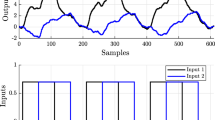Abstract
Optimal input design for system identification is an area of intensive modern research. This paper considers the identification of output error (OE) model, for the case of constrained output variance. The constraint plays a very important role in the process industry, in the reduction of degradation of product quality. In this paper, it is shown, in the form of a theorem, that the optimal input signal, with constrained output, is achieved by a minimum variance controller together with a stochastic reference. The key problem is that the optimal input depends on the system parameters to be identified. In order to overcome this problem, a two-stage adaptive procedure is proposed: obtaining an initial model using PRBS as input signal; application of adaptive minimum variance controller together with the stochastic variable reference, in order to generate input signals for system identification. Theoretical results are illustrated by simulations.










Similar content being viewed by others
References
J.C. Agüero, G.C. Goodwin, Choosing between open and closed-loop experiment in linear system identification. IEEE Trans. Autom. Control 52(8), 1475–1480 (2007)
M. Barenthin, H. Jansson, H. Hjalmarsson, Applications of mixed H2 and H∞ input design in identification, in Proceedings of the 16th IFAC World Congress, Prague (2005), pp. 458–463
H. Cramer, Mathematical Methods of Statistics (Princeton University Press, Princeton, 1946)
F. Ding, Y. Gu, Performance analysis of the auxiliary model-based stochastic gradient parameter estimation algorithm for state-space systems with one-step state delay. Circuits Syst. Signal Process. 32(2), 585–599 (2013)
P. Eykhoff, System Identification: Parameter and State Estimation (Wiley, New York, 1974)
V. Filipovic, N. Nedic, V. Stojanovic, Robust identification of pneumatic servo actuators in the real situations. Forsch. Ingenieurwes. 75(4), 183–196 (2011)
L. Gerencsér, H. Hjalmarsson, J. Mårtensson, Identification of ARX systems with non-stationary inputs-asymptotic analysis with application to adaptive input design. Automatica 45(3), 623–633 (2009)
G.C. Goodwin, R.L. Payne, Dynamic System Identification: Experiment Design and Data Analysis (Academic Press, New York, 1977)
R. Guo, L.S. DeBrunner, A novel adaptive filter implementation scheme using distributed arithmetic, in The Forty Fifth Asilomar Conference on Signals, Systems & Computers (ASILOMAR), Pacific Grove, California, USA (2011), pp. 160–164
S.V. Halunga, N. Vizireanu, Performance evaluation for conventional and MMSE multiuser detection algorithms in imperfect reception conditions. Digit. Signal Process. 20(1), 166–178 (2010)
S.V. Halunga, N. Vizireanu, O. Fratu, Imperfect cross-correlation and amplitude balance effects on conventional multiuser decoder with turbo encoding. Digit. Signal Process. 20(1), 191–200 (2010)
I.D. Landau, Unbiased recursive identification using model reference techniques. IEEE Trans. Autom. Control 21(2), 194–202 (1976)
Y. Liu, F. Ding, Y. Shi, Least squares estimation for a class of non-uniformly sampled systems based on the hierarchical identification principle. Circuits Syst. Signal Process. 31(6), 1985–2000 (2012)
L. Ljung, System Identification: Theory for the User, 2nd edn. (Prentice Hall, Englewood Cliffs, 1999)
J. Ma, F. Ding, Recursive relations of the cost functions for the least-squares algorithms for multivariable systems. Circuits Syst. Signal Process. 32(1), 83–101 (2013)
T.S. Ng, G.C. Goodwin, T. Söderström, Optimal experiment design for linear systems with input-output constraints. Automatica 13(6), 571–577 (1977)
R. Pintelon, J. Schoukens, System Identification: A Frequency Domain Approach (IEEE Press, New York, 2001)
C.R. Rojas, J.C. Agüero, J.S. Welsh, G.C. Goodwin, On the equivalence of least costly and traditional experiment design for control. Automatica 44(11), 2706–2715 (2008)
C.R. Rojas, J.C. Agüero, J.S. Welsh, G.C. Goodwin, A. Feruer, Robustness in experiment design. IEEE Trans. Autom. Control 57(4), 860–874 (2012)
C.R. Rojas, J.S. Welsh, G.C. Goodwin, A. Feuer, Robust optimal experiment design for system identification. Automatica 43(6), 993–1008 (2007)
A.N. Shiryayev, Probability (Nauka, Moscow, 1989) (in Russian)
T. Söderström, P. Stoica, System Identification (Prentice Hall, London, 1989)
D. Wang, R. Ding, X. Dong, Iterative parameter estimation for a class of multivariable systems based on the hierarchical identification principle and the gradient search. Circuits Syst. Signal Process. 31(6), 2167–2177 (2012)
J.S. Welsh, G.C. Goodwin, Finite sample properties of indirect nonparametric closed-loop identification. IEEE Trans. Autom. Control 47(8), 1277–1292 (2002)
M. Zarrop, Optimal Experiment Design for Dynamic System Identification (Springer, Berlin, 1979)
T. Zhou, Frequency response estimation for NCF’s of a MIMO plant from closed-loop time-domain experiment data. IEEE Trans. Autom. Control 51(1), 38–51 (2006)
Acknowledgements
The authors would like to express their gratitude to reviewers for their very useful comments and suggestions to improve this paper. This research has been supported by the Serbian Ministry of Education, Science and Technological Development through projects TR33026 and TR33027.
Author information
Authors and Affiliations
Corresponding author
Rights and permissions
About this article
Cite this article
Stojanovic, V., Filipovic, V. Adaptive Input Design for Identification of Output Error Model with Constrained Output. Circuits Syst Signal Process 33, 97–113 (2014). https://doi.org/10.1007/s00034-013-9633-0
Received:
Revised:
Published:
Issue Date:
DOI: https://doi.org/10.1007/s00034-013-9633-0




